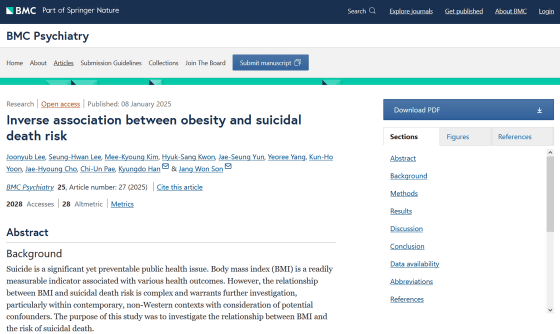Study finds that underweight people are at higher risk of suicide

Suicide is a serious public health issue, and in recent years, various research results that may lead to suicide prevention have been reported, such as '
Inverse association between obesity and suicidal death risk | BMC Psychiatry | Full Text
https://bmcpsychiatry.biomedcentral.com/articles/10.1186/s12888-024-06381-z

Underweight individuals are at an increased risk of suicide, study finds
https://www.psypost.org/underweight-individuals-are-at-an-increased-risk-of-suicide-study-finds/
Suicide can affect people of all ages, but the risk of suicide is particularly high among adolescents, older adults and marginalized groups. A wide range of genetic, social and physical factors have been identified that are associated with suicide risk, and conditions such as depression, migraines and insomnia have also been linked to an increased risk of suicide.
However, the relationship between body mass index (BMI), which has been linked to various health conditions, and suicide risk has not been well understood until now. Therefore, a research team including Joonyub Lee , a medical doctor at the Catholic University of Korea, investigated the relationship between BMI and suicide risk in Korean people.
The study used a comprehensive database of 4,045,081 Koreans aged 19 and over collected in the National Health Survey conducted by the Korea National Health Insurance Service in 2009. Subjects were classified as having a BMI score of less than 18.5 as 'underweight (skinny),' 18.5-23 as 'normal weight,' 23-25 as 'overweight,' 25-30 as 'stage 1 obesity,' and 30 or higher as 'stage 2 obesity.'

The subjects were followed from 2009 to the end of 2021, or until the time of suicide or death during the study period. The analysis took into account the subjects' BMI as well as potential confounding factors such as age, sex, income, diabetes, hypertension, dyslipidemia, smoking, alcohol consumption, exercise, self-harm,
The analysis found that people classified as 'underweight' based on BMI had a 44% higher suicide risk than those with a 'normal weight.' Meanwhile, the suicide risk of 'overweight' people was 21% lower than that of 'normal weight,' and that of 'class 1/2 obesity' people was 29% lower. The association between BMI and suicide risk was significant regardless of whether the subjects had been diagnosed with depression or lived alone.
The research team concluded: 'The risk of death by suicide was inversely associated with BMI classification and was not affected by major depressive disorder or living arrangements. Our data suggest that physiological factors related to weight play an important role in understanding the risk of suicide death.'

PsyPost claims that the study contributes to scientific knowledge about the relationship between suicide and BMI, but points out that the study was conducted in South Korea and results may differ in other countries.
Related Posts:
in Science, Posted by log1h_ik







